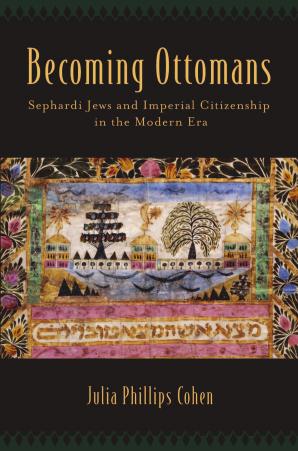Becoming Ottomans: Sephardi Jews and Imperial Citizenship in the Modern Era by Julia Phillips Cohen

Author:Julia Phillips Cohen
Language: eng
Format: mobi, pdf
Tags: kindle123
Publisher: Oxford University Press
Published: 2014-01-03T05:00:00+00:00
Conclusion
It was precisely this interpretation of proper patriotic conduct that other members of the Jewish community of Salonica and beyond came to contest in the debates surrounding the sultan’s visit in 1911. The picture that emerges from the scandals of that year is one of conflicting visions of where the loyalties of the Jewish community—and its leaders—belonged. Many Jewish elites, including the members of the Club des Intimes, asserted that working to save the public face of their community at all costs served the common good. Others suggested that hiding behind closed doors and carefully formulated pronouncements did not serve the Jewish community at all. The members of the Socialist Federation, as well as various Jewish journalists from Salonica to Istanbul, announced their position that difference, discussion, and even dissent were healthy, and that by attempting to foster each they paid tribute to their community (however defined). Those who found themselves on this side of the scandal during the sultan’s visit declared themselves unwilling to live with the fears of the “times of Hamid,” including self-censorship and the extreme restraint of the established Jewish communal elite of their city.
While the Club des Intimes and the Nouveau Club had vied for public recognition during the sultan’s stay in their city, the Socialist Federation of Salonica had been excluded from participating in—and, according to certain accounts, had purposefully opted out of—the festivities altogether. Although three of the four socialist leaders were allowed to return to Salonica once the sultan left the city, Abraham Benaroya was forced to remain in exile for many months.116 Indeed, well after the sultan had left the region, the governor of Salonica wrote the Ministry of the Interior that he considered Benaroya an ongoing threat and counseled that he should not be allowed to return.117 Acts of repression and limitations on the Federation’s ability to organize were symptomatic not only of the heightened visibility and tensions engendered by the sultan’s visit, but also of the political conditions that obtained in the regime more generally during this period. Word of the repression of the Socialist Federation in Salonica even made its way across Europe, to the offices of the International Socialist Bureau, which reported in a communiqué dated July 27, 1911, that a “great Labour demonstration convened to protest the arrest of four Socialists on the occasion of the Sultan’s visit to Salonica” had been forbidden by the authorities.118
The rifts within Salonica’s Jewish community were real. By late June, members of the Zionist and “assimilationist” camps in Salonica came to blows over their differences on their city’s streets.119 Yet, even as they clashed, members of each faction exhibited a striking level of confidence regarding their rightful place in the city, while simultaneously offering hints of their anxiety over the prospect of an uncertain future if that place were to be challenged. The centrifugal forces of re-bellion that promised to pull the empire apart were patently a cause for concern, but one that lay beyond the control of Ottoman Jewish leaders.
Download
Becoming Ottomans: Sephardi Jews and Imperial Citizenship in the Modern Era by Julia Phillips Cohen.pdf
This site does not store any files on its server. We only index and link to content provided by other sites. Please contact the content providers to delete copyright contents if any and email us, we'll remove relevant links or contents immediately.
| Africa | Americas |
| Arctic & Antarctica | Asia |
| Australia & Oceania | Europe |
| Middle East | Russia |
| United States | World |
| Ancient Civilizations | Military |
| Historical Study & Educational Resources |
Empire of the Sikhs by Patwant Singh(23070)
The Wind in My Hair by Masih Alinejad(5089)
Rise and Kill First by Ronen Bergman(4778)
The Templars by Dan Jones(4681)
The Rape of Nanking by Iris Chang(4201)
12 Strong by Doug Stanton(3541)
Blood and Sand by Alex Von Tunzelmann(3193)
Babylon's Ark by Lawrence Anthony(2671)
The History of Jihad: From Muhammad to ISIS by Spencer Robert(2618)
No Room for Small Dreams by Shimon Peres(2362)
The Turkish Psychedelic Explosion by Daniel Spicer(2353)
Inside the Middle East by Avi Melamed(2349)
Gideon's Spies: The Secret History of the Mossad by Gordon Thomas(2337)
Arabs by Eugene Rogan(2292)
The First Muslim The Story of Muhammad by Lesley Hazleton(2263)
Come, Tell Me How You Live by Mallowan Agatha Christie(2249)
Bus on Jaffa Road by Mike Kelly(2150)
1453 by Roger Crowley(2022)
Kabul 1841-42: Battle Story by Edmund Yorke(2020)
